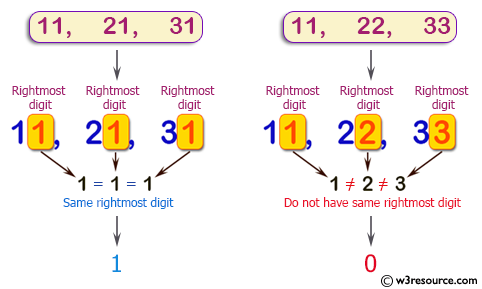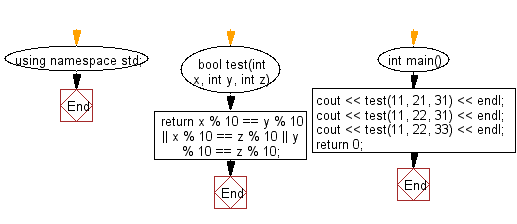C++ Exercises: Check if two or more non-negative given integers have the same rightmost digit
Same Rightmost Digit for Non-Negative Integers
Write a C++ program to check if two or more integers that are not negative have the same rightmost digit.
Sample Solution:
C++ Code :
#include <iostream>
using namespace std;
// Function 'test' takes three integers (x, y, z) as parameters
bool test(int x, int y, int z)
{
// Returns true if any two numbers among x, y, and z have the same last digit
return x % 10 == y % 10 || x % 10 == z % 10 || y % 10 == z % 10;
}
int main()
{
// Testing the 'test' function with different sets of numbers
cout << test(11, 21, 31) << endl; // Output: 1 (True, as two numbers end with the same digit '1')
cout << test(11, 22, 31) << endl; // Output: 1 (True, as two numbers end with the same digit '1')
cout << test(11, 22, 33) << endl; // Output: 0 (False, as no two numbers end with the same digit)
return 0;
}
Sample Output:
1 1 0
Visual Presentation:

Flowchart:

For more Practice: Solve these Related Problems:
- Write a C++ program to check if two or more non-negative integers share the same last digit by comparing their modulo 10 values.
- Write a C++ program that reads several integers and returns true if all of them end with the same digit.
- Write a C++ program to verify whether the rightmost digit of a list of integers is identical across all inputs.
- Write a C++ program that accepts multiple non-negative integers and prints true if they all have the same units digit.
Go to:
PREV : Strict Increasing Order with Equality Option.
NEXT : 20 Less Than Another Integer.
C++ Code Editor:
Contribute your code and comments through Disqus.
What is the difficulty level of this exercise?
